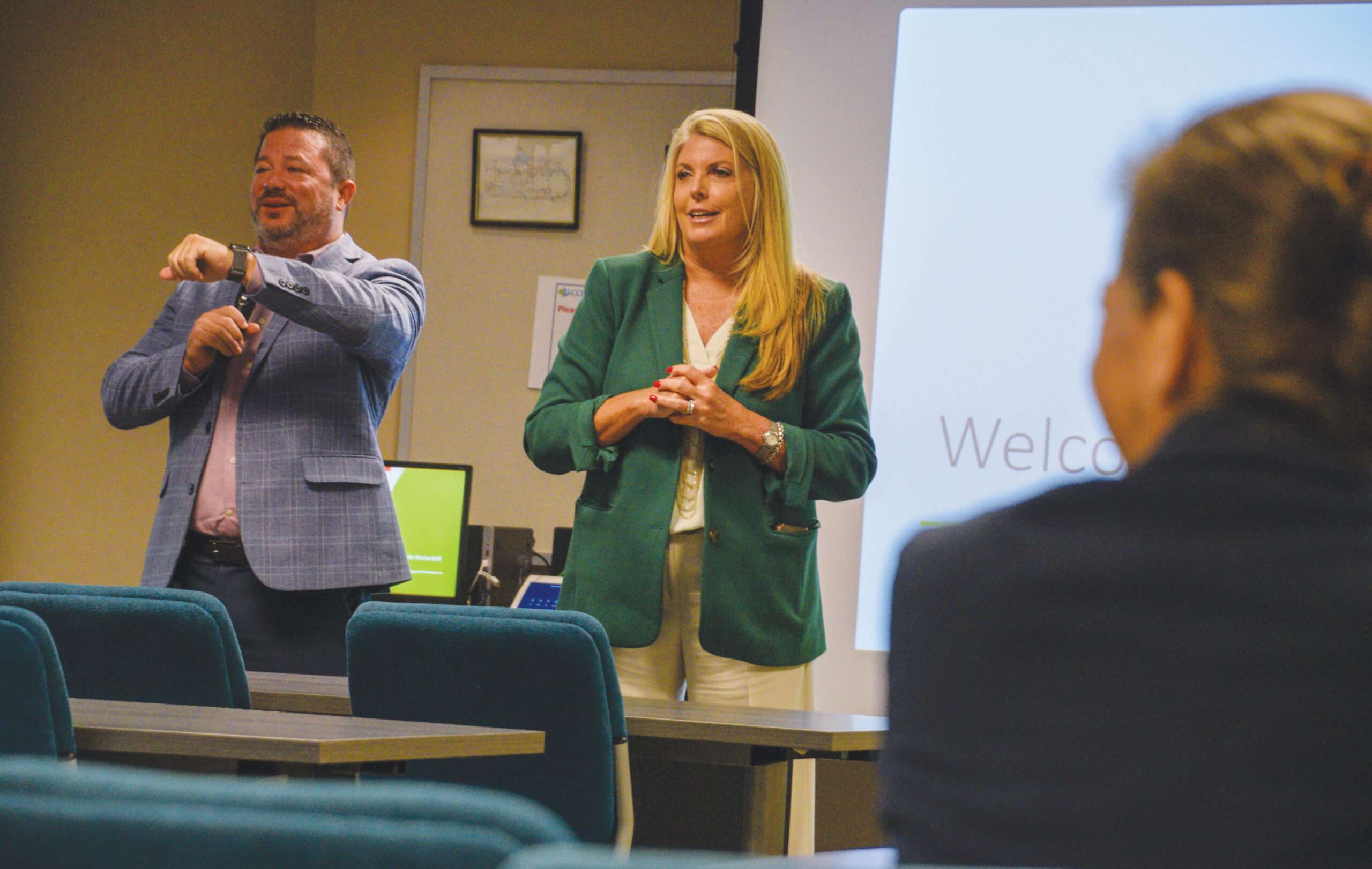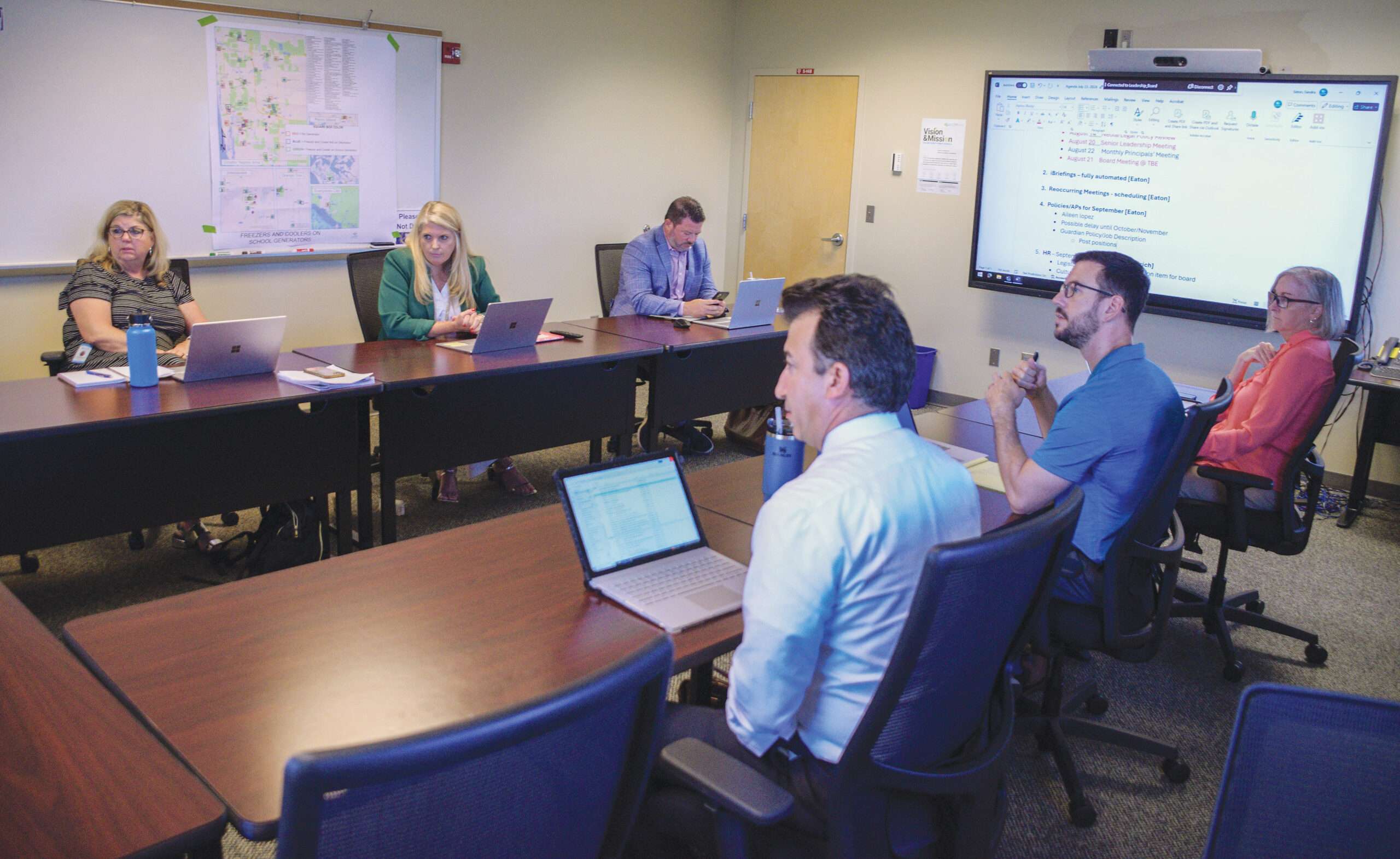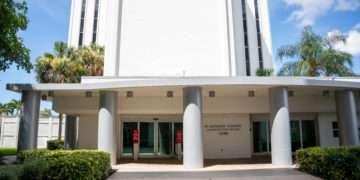Leslie Ricciardelli talks fast. That’s because, as Collier County Public Schools superintendent, she has a lot to say.
She also has a lot to do, and after her first year as superintendent, she still has items on her administrative bucket list. Not, she said, that the district was lagging when she assumed the position after Kamela Patton’s retirement.
“It was building on success,” she declared.
Still, education has become a complex undertaking in Florida, and education has reached corporate size in Collier County. Ricciardelli is the figurative CEO of the county’s largest employer, with around 7,000 employees and just shy of 50,000 young customers. A number of them, she said, are struggling through their formative years now.
The state has expanded its annual comprehensive testing, which once began in third grade, to kindergarteners and first and second graders. Teachers in those grades now have state curriculums to follow for core subjects.
Further, for the last two years, those tests have been administered to pupils online. “That’s a lot to ask a kindergartener, or a first or second grader, to do,” she said.
The effects of the pandemic have taken a toll on development, as well, and Ricciardelli sees the demise of pre-kindergarten programs here as a factor.
“There are very few pre-K programs in Collier County. We lost quite a few seats of pre-K because of COVID. Some of the places that were open for 20 and 30 years closed and couldn’t reopen,” she said.
“When they’re in pre-K they’re using fine motor skills. What [experts] found is that if they go to kindergarten and haven’t been to pre-K, their fine motor skills are lacking. So where kindergarteners used to use smaller blocks, now they have to use larger blocks.”
It has affected early learning to the point that Ricciardelli, working through Sen. Kathleen Passidomo, has requested $2 million from the state to seed some areas of the district with pre-K programs.
 A rich community history
A rich community history
There’s a special spot in Ricciardelli’s heart for early learning; her own early years were in Collier County schools, where she received her entire K-12 education. She brought up her children as Collier County Public Schools students.
But the superintendent’s experience as an educator has spanned every grade. Few people know this district like Ricciardelli, who has served as an Exceptional Student Education specialist; as an inclusion teacher for students with disabilities; and as an assistant principal at one time for discipline and another for curriculum. Then she served as a principal in both middle and high schools before moving into administration.
To say she’s done every job except custodial is shortchanging her: At one school, Ricciardelli got to know her students by hauling the trashcan around the cafeteria during pre-school breakfasts. As she encouraged students to pitch their refuse into the basket, she engaged them in conversation.
“You can really take the temperature of the students when you’re walking around in the morning,” she said. “You have a different conversation with kids in those unstructured settings.”
She remembered the facilities manager’s reaction to her equipment request at Golden Gate Middle School: “‘What do you mean you want a trashcan with wheels for the cafeteria?’” she recalled, chuckling. “That thing was heavy.”
With her student and career years here, Ricciardelli also sympathizes with the students who feel they are losing their alma mater, Lorenzo Walker Technical School, which will move toward a full technical college designation over the next four years. The schools even pondered, unsuccessfully, creating another technical high school to replace it.
But the eastern half of the county already operates the way technical education will in Naples, offering a full technical college campus to give students more access to the employability of a technical degree.
“In Immokalee and Palmetto Ridge, students attend their home school half a day and the Immokalee Technical College the other half,” she explained. In Naples, there’s no room for students from other schools to attend its technical college because Lorenzo Walker students have filled it—all except 17 seats last year. This will create a school that will serve the entire community, she said.
Ricciardelli’s career in Florida schools also means she has seen education from the faculty perspective, as well.
“One thing I’m proud of from the past year,” she said, “[was that], for many years, this community has felt frustrated because we have moved upward of 18 to 35 administrators from one building to the next. I changed that process, so that I’m not moving administrators based on whatever I think.”
Instead, where there are principal openings, staff can apply for them. They are required to tell their own staff, and the school seeking the principal chooses an interview committee to select the top two candidates for her to review.
“It’s a lot of work. But when you put a principal in a school and the teachers don’t buy into that principal, and they really loved their last principal, and they didn’t want to move … it creates a lot of stress and strife. For years, around January, people used to worry: ‘Am I going to get moved?’ Now they don’t have to worry. They are only going to move if they apply.”
She sees it as critical for teacher and administrator morale: “This is their school.”
 Living with state mandates
Living with state mandates
That Florida school career has also given her an intuition for its Department of Education maneuvers.
“Every five to six years they change the standards and the testing,” she said. “So we have to figure it all out and change, too.”
The district is only in its second year of using the current standards, which makes Ricciardelli particularly proud as the schools have placed higher than most in their comparable districts in the state. That includes testing in social studies—for which, by the fluke of a lawsuit on the way social studies texts are chosen, left the schools without physical textbooks for two years.
“We still outperformed the state in our civics and our U.S. history and of course assessments, which is so impressive, and it speaks volumes about the district staff and the teachers who worked so hard to make sure the standards were taught with fidelity,” Ricciardelli said. This year the students will once again have texts, she added with a sigh of relief.
The texts themselves are an intensive effort. New books must be selected from a state-approved list, and each text chosen from among those comes from a committee of administrators, teachers and the community.
The hard part is finding members of the community with expertise in the text topic who are willing to do careful reading, spend time ranking the books with other committee members and endure the potential criticism of parents who had their own choice in mind.
There are five texts to be approved this year, so the school district is searching for volunteers now.
Change, yes; change, no
Online learning is still a fairly young concept, according to Ricciardelli.
“I think we’re five to 10 years out on knowing what effect online learning has on education,” she said. She knows it is here to stay, however, and she knows artificial intelligence is in the future of education, for better or worse.
“This may lead to a totally different way of learning,” she said. “If this is going to tell me all the answers, why do I need to get to the answers?” What students may be tested on instead in the future, she said, is how well they can explain what questions they’re asking AI and why those questions were chosen.
One thing will not change in Collier County schools, she emphasized: a strong focus on education and on the students for whom they’re responsible. “People are sending you their prized possession, their child, for seven hours of the day. People have to have faith and believe in who has their child.
“I feel very strongly about this, and I say the same thing to everybody: You should be the same teacher or the principal or the assistant principal that you would want your own child to have.”
This story was published in The Naples Press on Aug. 2.





